THUNDER BAY - Kyle Arnold said he used to live his life like it was a music video, with fancy new cars, penthouse suites, and gold chains around his neck. But that lifestyle as a drug dealer, user, and gang member resulted in him being hospitalized numerous times and eventually homeless in the city of Thunder Bay. And while he is still recovering from the decisions he made more than 17 years ago, he’s now helping others in the city because he believes no one is too far gone to ask for help.
“A lot of people stop believing in themselves and they think they are too far gone,” he said. “I truly don’t believe there’s anybody who is too far gone. As long as you ask for help, there is a chance.”
Arnold shared his story as part of a video series released by the Thunder Bay Police Service aimed at preventing gang recruitment among youth.
The video series was undertaken by the Police Service’s Community Outreach Branch and unveiled Tuesday evening alongside community partners that assisted in the project.
The four videos, produced by Generator and funded through Ministry of the Solicitor General Proceeds of Crime Front-Line Policing Grant Program, include individuals sharing first-hand experiences of being recruited into gang activity.
“Our interactions that our core unit members make in collaboration with the outreach workers connected us to people with lived experience,” said Inspt. Derek West with the Community Outreach Branch of the Thunder Bay Police Service.
“Their stories really brought the power of what they’ve gone through and allowed us to see through what it was we wanted to get and tell these kids about the life of being in a gang.”
Arnold said having someone with that lived experience share their story makes a huge difference when it comes to educating people, especially youth, about the realities that come with becoming involved in drugs and gangs.
“Even in my recovery journey, I was able to get clean because I was able to talk to people who have gone down that path,” he said. “I think it’s so much more powerful when you are talking to people who have been through it.”
Other videos included in the project include Jessica sharing her experiences of being trafficked by her partner and how she was able to finally escape that life, as well as a spoken word poem written by poet and public speaker Wali Shah, entitled ‘Dear Self.’
The poem is written as a palindrome where it can be read from both forward and backward.
“The first half of what I shared in this piece was incredibly negative. But it was also an accurate and realistic depiction of what people go through when they are in situations or drug abuse, gang violence, human trafficking,” Shah said.
“When that is flipped, it gives you that completely different perspective on how those experiences can be transformed into something positive. I wanted to have the dichotomy of those experiences put together in one piece. For me, it was showing two sides of the story.”
Over the last six months, Shah also met with students at several local schools, including Denis Franklin Cromarty High School, Hammarskjiold High School, St. Patrick’s High School, and Westmount Public School.
Shah led the students through various writing exercises and he said everyone was engaged, attentive, and high energy.
“I think that really speaks to how much there is a need for conversations like this and for interactive sessions, presentations, seminars for artistry, especially art therapy,” he said.
West added that youth have more risk factors making them vulnerable to gang activity and recruitment, particularly youth from remote northern communities who come to the city and lack the same supports as back home.
The Community Outreach Branch will measure the success of the videos by the response they receive from youth and will then look at other opportunities to further the project.
“We want to get the word out through the videos we created with our partners and get that story,” West said. “Once we see how that is accepted and resonating with the youth and what it is doing for them, we will build on that and what comes next.”
Shah believes that even if one youth who watches the videos decides not to engage in drug or gang activity the project will be a success, but he is confident that the messages being shared will have a far greater reach.
“These are the ways we can spark conversation for that to even happen,” he said. “For them to see other people being vulnerable enough to share their stories like the ones that we documented, that might be the reason someone else who is in that situation, especially a young kid, might actually say: ‘maybe I can actually share my story too.’”
“I hope it impacts them in a way that they really take the time to make those good choices,” Arnold added. “I hope it shows them that life isn’t a music video. There are consequences for our actions and that we need to reach out for help. Just ask for help before you get involved in that sort of life.”
